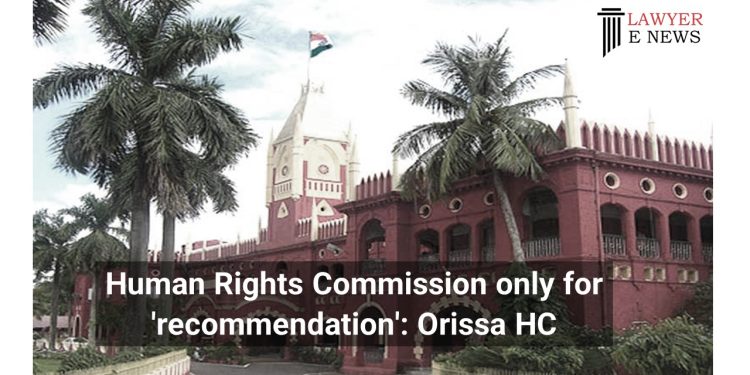Human Rights Commission only for ‘recommendation’: Orissa HC

D.D:29-JUNE-2022
The Orissa High Court has ruled that Section 18 of the Protection of Human Rights Act of 1993 only authorises the Human Rights Commission to “recommend” compensation and not to issue it directly. Notably, the section specifies actions to be taken by the Commission “during and after investigation.”
A Single Bench of Justice Arindam Sinha made the observation “Section 18 outlines steps to take during and after an investigation. Due to the Commission’s failure to conduct an investigation, it was unable to invoke section 18 for any of the actions required thereunder. Despite this, the provision only authorises the Commission to make recommendations.”
Contentions:
Mr. A.K. Sharma, Additional Government Counsel, represented the State as petitioner. He argued that the Commission exceeded its authority by ordering the Chief Secretary of the Government of Odisha to pay Rs. 1 lakh in compensation to each of four diarrhoea-related decedents.
He argued, based on sections 13 to 18 of the Protection of Human Rights Act, that the Chief Secretary should have been afforded an opportunity to be heard. The communication resulted from the mere issuance of a show-cause notice and the rejection of the reply. In addition, he argued that, according to Section 18, the Commission only has the authority to make recommendations, whereas in this instance, a directive to pay has been issued. Therefore, the stated direction lacks authority.
He drew the Court’s attention to the 30th of October, 2019 response to the show cause and stated that the State’s investigation revealed that the villagers had dug a well. A stream was also present. They formerly obtained their drinking water from the well and the stream. The presence of a modified, virulent strain of “vibro cholera” was detected in water samples from the well and the stream.
In addition to taking all measures to provide medical assistance to the villagers, he stated that the administration held group meetings and warned the villagers not to drink from the well and stream. In addition, continued tank and pipe water supply was mandated. Under the circumstances, he argued vehemently that the administration could not have been ordered to pay compensation.
The court observes:
The Court observed that, based on the documents disclosed in the writ petition and a review of the challenged communication, it did not appear that the Commission had initiated an investigation. As the Commission did not conduct an investigation, Section 16 did not apply, as there was no question of the Commission deeming it necessary to investigate the conduct of any individual or forming the opinion that the reputation of any individual is likely to be damaged. Simply, the Commission issued a show cause notice in the proceeding it initiated in response to the complaint filed by the first opposing party.
Additionally, the Bench observed, “In a response dated 30 October 2019, the administration informed the Commission of its investigation revealing that the villagers had dug a well and consumed water from it and a stream. A water sample revealed the presence of a modified, virulent Vibro Cholera strain. The administration also reported that the village’s tank and pipe line water supply continued. In the absence of an investigation by the Commission, the State’s assertion that a tank and pipe water supply existed and must be maintained cannot be disbelieved.”
The Court clarified that Section 18 stipulates actions during and after the investigation. As the Commission failed to conduct an investigation in this case, it could not invoke Section 18 for any of the actions to be taken thereunder. In effect, the provision only authorises the Commission to make recommendations and not to direct compensation.
Due to the aforementioned causes, it was determined that the challenged communication was issued in excess of authority and, as such, it was declared null and void. Nonetheless, the court acknowledged that four people perished in the alleged incident. Therefore, it ordered the State to evaluate its compensation policies to determine if compensation or ex gratia must be paid to the next of kin.
State of Odisha & Ors.
Versus
Radhakanta Tripathy & Anr.






